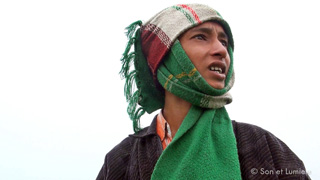Char . . . The No-Man’s Island
 INDIA, JAPAN, ITALY, DENMARK, NORWAY / 2012 / Bengali / Color / Blu-ray / 88 min
INDIA, JAPAN, ITALY, DENMARK, NORWAY / 2012 / Bengali / Color / Blu-ray / 88 min
Director, Producer, Editing: Sourav Sarangi
Photography: Sourav Sarangi, Rabindranath Das, Minarul Mondal
Sound Design: Sourav Sarangi, Taguchi Kyohei
Production Company: Son et Lumière
Co-Production Companies: NHK, Stefilm International S.r.l, Final Cut for Real ApS, Cinema Oslo
World Sales (Outside Asia): CAT&DOCS
Source: NHK (Japan Broadcasting Corporation) www.nhk.or.jp
Floating on the sandbanks of the great river Ganges, which runs between India and Bangladesh, are islands of sediment called “chars.” This meandering river changes its flow with cyclones, and its fragile earth frequently caves in. Those who live there have lost their homes countless times. This film, shot over a period of over 10 years, focuses on the life of Rubel, a boy who lives on a char. His community sells goods on the black market, braving danger to save money, but still has no means to escape their poverty. Natural threats cruelly erode the footing for their destitute way of life, and loom with a silent, tremendous power.
[Director’s Statement] A small Indian village called Parashpur, close to the Bangladesh border, once vanished before my eyes. Trees, buildings, roads—everything but humans slowly disappeared into a watery grave. The River Ganga was eroding.
“The River Ganga has turned into a snake here,” the villagers told me. In Indian culture Ganga is believed to be the holy mother flowing from heaven. Why should they call Mother Ganga a snake today?
The villagers told me, “After the construction of the Farakka Dam, the river has turned into a snake caught by its neck. And for its survival, the snake strikes back and forth to take away everything she gave us over the ages.”
And years later the river gave back what it took; the lost land resurfaced within the river course as a fragile island called Char. Naturally it belongs to those homeless victims of erosion. But our political system has made it inaccessible since the international border was fixed on the same spot! Char, the new land of hope, becomes a prohibited zone to enter.
In Char I met Rubel, a village boy who survives by smuggling rice from India to Bangladesh. “You can fix a border but not a river. A river will move and so will her people,” he told me, smiling.
By making films you look into lives of others. But I believe filmmaking also affects the filmmaker in some way. By being in Char with special military permission, I witnessed events and emotions in a rather strange way. My perspective of looking into other’s lives went through transformations that I wanted to share.
The trust between man and nature in Char haunted me for days and nights, and now I tell this story.
 Sourav Sarangi
Sourav Sarangi
Sourav Sarangi was born in 1965. His debut film Tusu Katha (1996) received awards from many leading international film festivals. Since then he has been editing, writing, directing, and producing in both fiction and nonfiction genres. Currently, he is involved in international co-productions as an independent producer and director. His recent award-winning documentary titled Bilal (2008, YIDFF 2009 Award of Excellence in New Asian Currents and Community Cinema Award) was based on observations about a three-year-old child growing up with blind parents. Char . . . The No-Man’s Island is his latest work, and has been awarded and presented at many major festivals all around the world.
